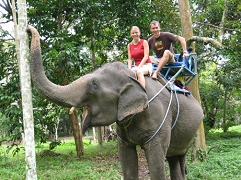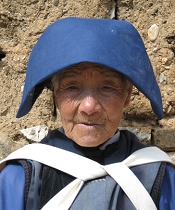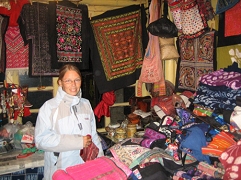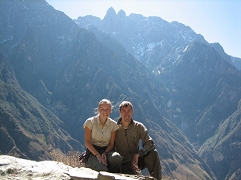 |
 |
Update letter 6, March 2007
Read this letter in PDF format
March 6, 2007
Happy Chinese New Year of the Pig! We’re “home” again! It feels nice to be home after several weeks living out of a suitcase. In the middle of January we finished the first semester and gave our exams (about 500!) and then the college closed down—as schools do here in China—for their winter break around the Chinese New Year. During this time we have traveled, and we also attended Amity Foundation’s Winter Conference. It has been a long and quite interesting trip!  | | |
First we flew to Thailand, where we split our time between two islands: Phuket and Koh Samui. Thailand was a relaxing, rejuvenating time where we swam in the ocean, read lots of books, ate great Thai food, snorkeled, and once we also rode an elephant (!). Although Thailand felt like a world away from China, through glimpses into Thai society and culture we were sometimes reminded that we were still in Asia; for instance, we could see this when we watched 10-15 locals standing in the back of a speeding pick-up truck to get to work in the mornings. We could also see that it was Asia when we drove through small villages on Koh Samui. Away from the touristy areas, these places were much poorer indeed. Sometimes there were some uncommon sites: men who would try to tempt us to pose with an exotic animal for money, and would thrust a huge eagle in our faces as we squeezed by him on the sidewalk, or if not an eagle, a monkey, or a giant snake.  | | |
After Thailand we flew to Chengdu, in Sichuan Province, for Amity Foundation’s Winter Conference. It was great to see all of our colleagues again and to share teaching experiences and stories with each other. During the conference we attended meetings and workshops, and we also visited the local church, and had devotions together. We also traveled several hours by bus to see some of Amity’s other projects first-hand. Amongst other projects, we visited two blind men who have been helped by Amity. The visit to the first blind man, in particular, made quite an impression on all of us. He was happy to tell us how he is now able to do many daily chores by himself, thanks to Amity. The man also told us that he is now able to contribute to his family’s economy through making bamboo incense sticks. We felt humbled when he proudly told us that he now earns up to 80 RMB per month (about $10). Another humbling experience at that project visit was when the family showed those of us in need to their “restroom.” This marked the first (and last?) time that we used this kind of bathroom, which consisted of a tiny hole in the cement floor in the middle of the dark barn…yes, literally inches away from the fat pink pigs (some Amity colleagues later reported having been “nudged”). So now we can say that we have literally been to the bathroom in a pigsty, and I must admit, I am sure that I have never been faster in and out of a bathroom in my entire life! But even as I write this I am aware of the fact that even when we later thanked the family for the friendly visit and then returned to our comfortable hotel, that the family themselves continue to live there and that is the reality of their daily lives.  | | |
Also while in Chengdu we had the opportunity to visit the Giant Panda Breeding Research Base, where we could see amazingly cute, but terribly lazy, sitting and being fed bamboo, or even lying down and eating bamboo. (See a video of pandas eating on our web page). We also visited a Sichuan theatre, which we loved, with its mixture of changing traditional masks, tea pouring, drums, puppets, and other exotic performances. While in Chengdu, I had my first experience with a Chinese dental office. While eating, a piece of a tooth broke, forcing me to the dentist, something that I was wary of here in China. (Although I was very grateful this happened while we were in a big, modern city, and not in our remote village…) But it was quite an experience indeed. The office itself was total chaos, with hundreds of people waiting in various lines to various rooms, payment lines, etc. We could not understand anything but were finally helped. The major difference between dentists back home is that complete and total lack of privacy. Forget a fresh, clean, quiet office with one chair and calming posters on the ceiling! When we entered my dentist’s “office” we were shocked: in the middle of the huge room were 16 dentist chairs, with dentists, hygienists or nurses rushing around the patients. But that was not all. Milling around these chairs, watching the procedures, wearing all their outer clothing including stocking caps, were dozens of people just curious as to what was going on! These people also milled about and watched the dental activity, adding to the chaos. Note that when Chinese people wait (or do anything, for that matter) they do not speak in quiet, “inside voices.” They talk loudly, shout across the room to each other, or speak loudly in cell phones. The dentist, a competent young man with whom I felt very comfortable, laughed when I told him what it was like to go to the dentist back home. He said, “My office is like going to the vegetable market!” and that is exactly what it was like! Traveling in China gives us a chance to learn about the various cultures, especially the Chinese minority cultures, and traditions in China. Yunnan Province, in particular, has a rich minority culture heritage. After the conference Tomas and I traveled south, an 18-hour train ride, to Yunnan Province. Yunnan is on the border of Myanmar (Burma), Laos, and Thailand. Our first destination was Kunming, the capital of the Province. Kunming is called the Spring City, and we could easily see why. Even then, in February, when I heard about blizzards back home in MN, we were enjoying clear skies, warm sun, and flowers all over the city. Kunming is generally a very clean city also, so our time there was quite pleasant.  | | |
However, we were alarmed by the great number of beggars we saw, sometimes right outside a rich shopping area, their diseases or stumps of missing limbs uncovered for all to see, in order to invoke pity and thereby, perhaps receive a coin or two. As always, it feels disturbing to see so many people living in the periphery of society, in such an outwardly rich area. Yunnan Province is known for its many minorities, many who wear traditional clothing in their daily lives (such as this Naxi woman in blue). In Yunnan we also saw some foods that were new for us, such as larva and grasshoppers…! Also, we continue to work on our Chinese skills. Once Tomas accidentally hit a tiny old Chinese woman in the face with his backpack as he turned around. When he saw what he had done, he quickly tried to apologize. But in his surprised state he blurted out, “Doushao qian?” (how much does it cost?) instead of a more appropriate, “Duibuqi” (sorry). Feeling flabbergasted he then just kind of scurried away!  | | |
After Kunming we traveled by bus to the cute old city of Dali. Snow-capped mountains decorate the background of the city, making it a very picturesque place. We spent several days there, relaxing, wandering around the old streets, visiting cute shops, and eating at local places and cafés. Surprising and annoying, however, were the frequent drug offers by cute old ladies! In the end we started responding, mostly out of frustration, in Chinese, that not all foreigners smoke drugs, at which point they would apologize and leave us alone, for a while. While eating at a local Dali café and enjoying their very modern wireless Internet access, we called my cousin, Helene, and her family on Skype. Since we had our web camera with us we were able to look at each other as we talked. At that point Helene’s young son suddenly asked, in his very old Swedish dialect, “E e da Kinâ?” which means, “Is that China?” It was such an innocent question that we all just laughed. We take so much for granted now that we have access to such great technology, but Isak really wanted to know if he really, truly, was looking at China through his computer screen. Of course, he also meant, “So that’s it?” (As in, THAT’S what I have been hearing so much about?!) Cafés are becoming quite popular in China, we are noticing. Of course where we live we do not have such things as cafés, but in larger cities they are growing in popularity. When traveling we sometimes visit cafés, and when we do, it is fun to see the Chinese people eat. Just as they probably find it quite interesting to see how we tackle different food customs here in China, (or at Chinese restaurants abroad, for that matter) we find it humorous to watch them eat. In Chengdu we sat next to two young women, dressed in trendy clothing, who had ordered several dishes that they placed in the middle of the table, Chinese-style, to pick and eat from all of them at the same time. The problem that we saw with this was that they saw no distinction between different courses, probably since the concept of dessert does not exist in China. These girls ate their tacos at the same time as they ate their ice cream sundaes, surely thinking of it all as one and the same, just a western-style meal…After Dali we moved on to the UN classified World Heritage Site city of Lijiang. It was easy (and fun) to get lost in the winding, curving small streets. The streets were all lined with small shops, cafés, teahouses, and restaurants. While we were in Lijiang we had our first encounter with the Chinese New Year. In a word: it was CRAZY. We have never seen anything like it! Chinese people love their fireworks year-round. (Anytime a new restaurant opens, or there is a wedding, or a birthday, or who knows why, all of a sudden extremely loud fireworks or firecrackers can go off, in the middle of the city, day or night, it doesn’t matter). So when the biggest day of the year arrived, the fireworks were more than ever. Tomas and I went up a hill, together with our Amity friends and colleagues who were with us, Kyle, Megan, and Andrew, and we stood there, and watched. And watched. And watched. All over the city, both inside the city and outside, shooting up from alleys, even from apartment windows, and everywhere in-between, were fireworks. Back home fireworks displays take place in an orderly, organized fashion. But “orderly” and “organized” are two words that don’t appear to exist in China at all. For the longest time the fireworks just continued to blast and shine, from everywhere all at once. It felt like we were watching a war zone! (See a video clip of the fireworks on Chinese New Year’s Eve soon on our web page). Lijiang is a very popular city for Chinese tourists. Watching these tourists is quite amusing! Thousands of Chinese people in tour groups filled the narrow streets, and as they walked, they followed the leader, almost always a local woman carrying a flag or an umbrella. The Chinese tourists themselves seemed to think they were very close to nature in Lijiang, because many of them wore hiking clothing, including hiking boots (one man even had an ice pick!) and cowboy hats, as they toured the city! We frequently saw Chinese men, dressed in hiking clothing, cowboy hats, and holding a rifle, as they rode through the city on horses, while their wives walked alongside and took pictures of them. Much of Yunnan Province has a very high elevation—over 2000 meters—which is why the weather is almost always pleasant. During the day we could wear t-shirts, but at night it was quite cold. In many parts of China, this province included, people do not have any indoor heating. This means that our hotel or guesthouse rooms were often freezing cold. Our room was frequently 7 °C! (45 °F) Luckily, beds were heated, so it was fine. But now we are even more grateful for our location in Gansu, where our apartment is heated to a comfortable room temperature.  | | |
After Lijiang we then embarked on a real adventure, hiking in Tiger Leaping Gorge, which is a beautiful area where the Yangtze River curves between two high and rugged mountain chains. The difference in elevation between the river and the top of the highest peak is a stunning 3900 meters! Together with our friend and colleague, Andrew, and some other people we met along the way, we hiked for two days in gorgeous natural scenery. Along the narrow trail we sometimes met other hikers, and we frequently met locals offering us rides on their horses. There were so many horses, in fact, that Tomas actually became quite allergic on the hike! We spent two nights at cute, locally-owned guesthouses. (The second night Ed Norton was at the same guesthouse as us!) See several pictures from our hike, and check our web page soon also for many more pictures. Sometimes the trail was very narrow and the drop-offs quite nerve-wracking, but we continued on. Frequently we met locals walking along the trail with their herd of goats. In places the hike was quite easy, while at times it was very steep and rocky. With the hot sun beating down on us, even though it was February, we all wished we had packed shorts! Getting into nature is something that is not so easy to do in China, so we really enjoy taking any opportunities that arise. There is talk of a new dam in the works for China. If it is built it will destroy the Gorge, which is one of China’s best natural treasures. We are aware of growing needs for energy, and we can see first-hand how black, dirty coal smoke clouds the air, but at the same time it seems tragic to destroy such an unspoiled natural area. After Tiger Leaping Gorge we began our journey home. Due to the very backwards and frustrating Chinese train ticket system (actually, due to the complete and total lack of a pre-booking system for train tickets) we allowed several days to make it home, and we ended up needing these. In the end, to end the approx. 45-hour return trip home, we took a taxi the last 5 hours to bring us back to Chengxian. And it feels great to be back!On our first day back to Chengxian, we needed to do errands, so we walked into town, where we met a parade. There were brightly-dressed locals, walking behind floats with people and music on loudspeaker. As we walked along the rode, we noticed that bystanders and parade people alike were not paying attention to the parade; they were all staring at us! Then many of the people in the parade began to yell “hello” and wave to us. We waved back, laughing, and said to each other, “We’re home again!” Last weekend we had our second group of visitors; Tomas’ cousin, Maria, and her husband, Olov, were here for two days. It was great to have them here, and of course it is always nice to receive some Swedish foods and treats that we miss! We have begun teaching again now. Tomas and I will both continue to teach reading (6 classes each) and this semester I will also teach a class called “English song and performance.” We have now been here for 8 months, (time flies!) but still we always look forward to letters from people back home. Visit our web page soon, also, for more pictures and videos from our trip. Please sign the guestbook! Rachel and Tomas
|
 |
 |
